Awards & Grants
In this section
- Exciton Science researchers receive ARENA grants
- Dane McCamey awarded Sir Paul Callaghan Medal
- Exciton Science project a Eureka Prize finalist
- Ivan Kassal awarded ARC Future Fellowship
- Avail Solar receive CSIRO bonus
- Heyou Zhang wins Chancellor's Prize
- Carol Hua receives WISER Award & Alan Sargeson Lectureship
- Nas Meftahi wins RMIT ECR Award
- Anita Ho-Baillie joins Exciton Science colleagues as Fellow of the Royal Society of Chemistry
- Tim Schmidt elected Fellow of Royal Society of Chemistry
- Girish Lakhwani appointed Associate Dean & joins ARC College of Experts
- Sam Zaman wins GCI Women in STEM Student Award
- Exciton Science members awarded National Intelligence & Security grant
Exciton Science researchers receive ARENA grants
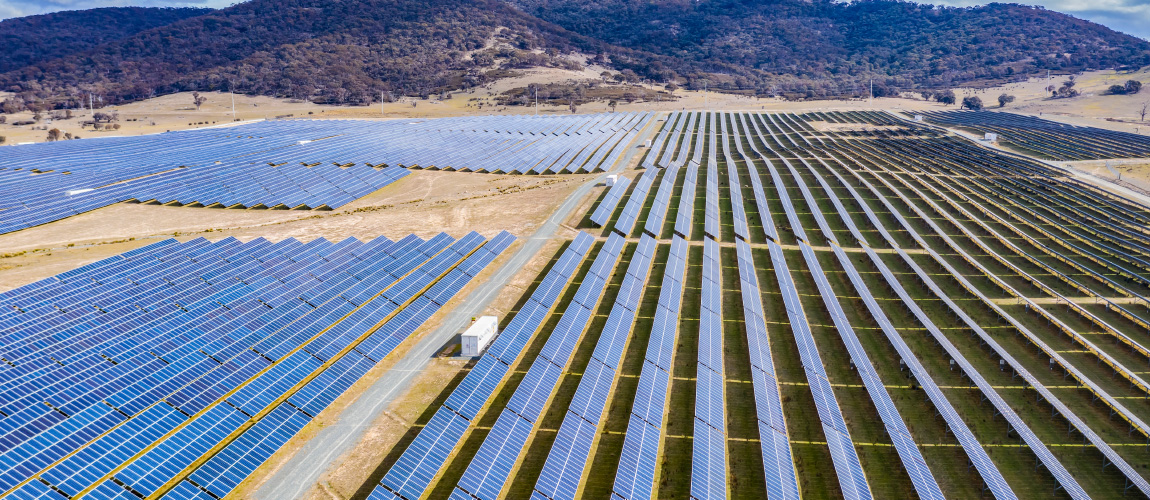
Teams led by Exciton Science’s Tim Schmidt, Nicholas Ekins-Daukes and Anita Ho-Baillie are among the recipients of AU$41.5 million in new funding to research ultra low cost solar.
Awarded by the Australian Renewable Energy Agency (ARENA), the funding supports projects that aim to reduce the cost of solar by three quarters of the current price.
The collective goal of the latest round of ARENA grants is to increase solar efficiency from 27% to 30%, and reduce the installed cost from $1.20 per watt to 30 cents per watt, all by 2030.
Professor Ekins-Daukes, an Exciton Science Associate Investigator, and Professor Schmidt, a Chief Investigator, have received AU$4.8 million to support the establishment of Omega Silicon.
The project will build on a decade of singlet fission research by Professor Schmidt in a bid to exceed the absolute efficiency limit of silicon solar cells while maintaining low manufacturing costs.
They will be joined on the project by Exciton Science members Professor Dane McCamey, Dr Phoebe Pearce and Associate Professor Jon Beves.
Exciton Science Associate Investigator Anita Ho-Baillie of the University of Sydney was awarded AU$2.78 million to work with renewable technology company SunDrive on the commercialization of perovskite-silicon cells.
This project will focus on stacking perovskite on top of silicon to form a tandem solar cell, rather than using silicon on its own.
“The idea of this stacking is to convert more energy from the sun to electrical power,” said Professor Ho-Baillie.
“The efficiency that can be achieved by a perovskite-silicon tandem in a laboratory is now over 30 percent, while the highest efficiency for a silicon cell on its own is just below 27 percent in the laboratory and around 23 percent commercially.
“There isn’t much room for silicon to improve because its theoretical limit is only 30 percent – but for perovskite-silicon tandem, it is 40 percent.”
Read moreDane McCamey awarded Sir Paul Callaghan Medal

Chief Investigator Dane McCamey
Exciton Science congratulates Dane McCamey on being awarded the Sir Paul Callaghan Medal by the Australian and New Zealand Magnetic Resonance Society(ANZMAG).
The Medal commemorates the contributions of Sir Paul Callaghan (1947-2012) to magnetic resonance research, education and development in Australia and New Zealand.
It recognises a senior researcher within 15 years of completing their PhD and is awarded every two years.
Professor McCamey is an Exciton Science Chief Investigator and Pro Vice-Chancellor (Research) at UNSW.
Dane completed his PhD at UNSW in 2007, followed by postdoctoral research roles at the University of Utah and the University of Sydney.
He returned to UNSW in 2013 and was awarded an ARC Future Fellowship a year later.
“I’m humbled to receive the Sir Paul Callaghan Medal and grateful to my fellow ANZMAG members for selecting me,” Dane said.
“The previous recipients of this award set a high bar, and I’m hopeful my group will continue to honour them and the award’s namesake by maintaining the high quality and impact of our research in the years ahead.”
Dane is a highly creative physicist who works at the intersection of quantum science, condensed matter physics and chemistry.
His work focuses on understanding the microscopic electronic processes that govern the operation of modern electronic materials and devices.
Dane is best known for his work on electrical detection of magnetic resonance, employing this technique to achieve influential results in silicon and in organic electronic devices.
In silicon, he has made important contributions to our understanding of spin-dependent recombination at high magnetic fields.
Dane demonstrated the first electrical readout of a nuclear spin in silicon via an electrically detected electron nuclear double resonance (ENDOR) approach.
In a 2017 paper in Nature Physics, he and his team first reported the presence and importance of a quintet intermediate state in singlet fission, in what has become one of the most cited recent papers in electron spin resonance.
Exciton Science project a Eureka Prize finalist
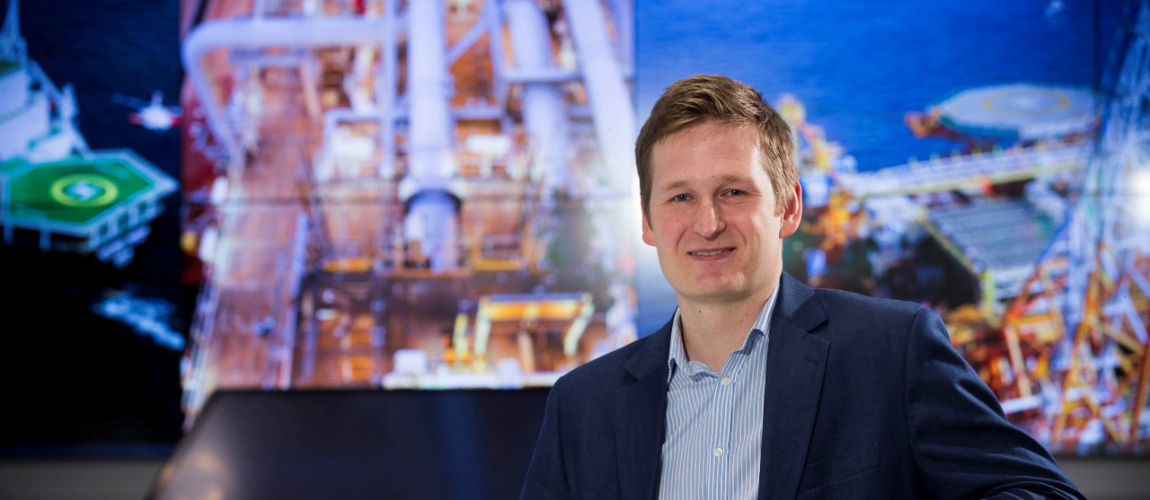
Chief Investigator Jacek Jasieniak
A research innovation project led by members of Exciton Science has been selected as a finalist in Australia’s premier national science awards, the Eureka Prizes.
The project, led by Exciton Science Chief Investigator Professor Jacek Jasieniak, focuses on windows capable of supplying electricity by serving as active-power generators. It is in contention for the Eureka Prize for Innovative Use of Technology.
Working with Exciton Science Partner Investigator Dr Anthony Chesman of CSIRO, Jacek’s group in the Department of Materials Science and Engineering at Monash University have created semi-transparent solar cells made from metal halide perovskites.
The physical characteristics of perovskites mean they are very efficient at generating electricity while also being transparent, and they can be printed as very thin films, making them ideal candidates for integrated applications in buildings.
Researchers have also shown films made using metal halide perovskites can be “tuned” to achieve optimal balance between light transmission and power generation.
Modelling shows solar windows could produce up to 100% of the total electricity needs of a fully-glazed skyscraper, substantially reducing the building’s net CO2 emissions.
Future development work in the project will focus on translating laboratory-based production methods to scalable production suitable for window sizes commonly used in commercial construction.
Dr Jenny Zhou of Monash University’s Department of Civil Engineering is also part of the team nominated for the prize.
About the Eureka Prizes
The Eureka Prizes, presented annually by the Australian Museum, honour excellence across the areas of research and innovation, leadership, science engagement, and school science.
The Eureka Prize for Innovative Use of Technology is presented by ANSTO and awarded for an innovative application of a new or existing technology that has led to a significantly improved research outcome.
The Eureka Prize for Innovative Research in Sustainability is presented by the University of Sydney Faculty of Science, and is awarded for research that has produced innovative solutions to support ongoing and improved sustainability practices or policies
Winners of the Eureka Prizes for 2023 were announced during a live broadcast event on Wednesday 23 August.
Ivan Kassal awarded ARC Future Fellowship
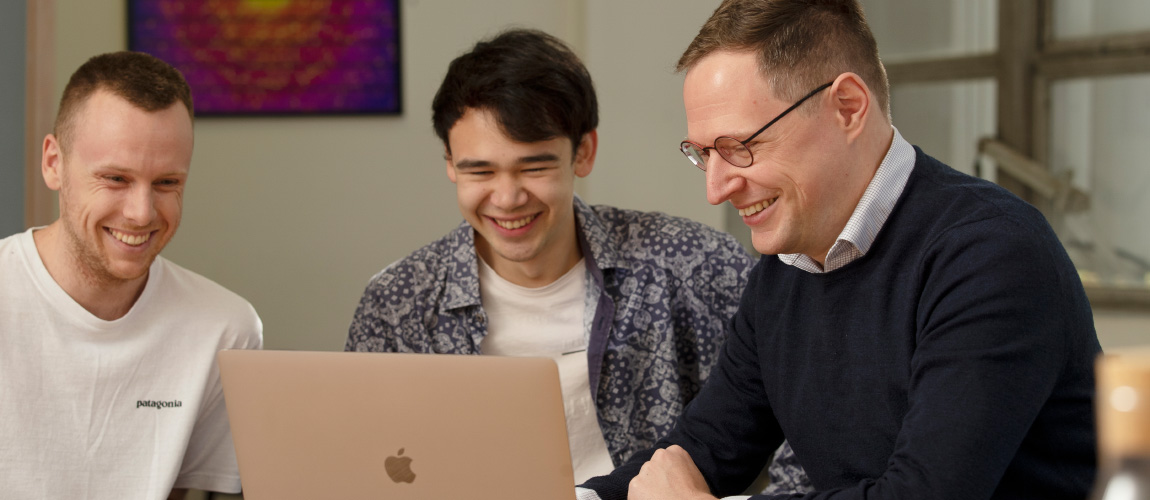
Associate Investigator Ivan Kassal
Exciton Science congratulates our Associate Investigator Ivan Kassal on being awarded a Future Fellowship by the Australian Research Council.
An Associate Professor at the University of Sydney, Ivan has received a grant of AU$1,114,292 to enable a new capability for simulating practically relevant chemical dynamics and reactivity in regimes where conventional computational chemistry fails.
The project expects to do so by generating an extensive toolbox of quantum algorithms that would allow quantum computers to carry out otherwise intractable simulations of a wide range of chemical processes using existing quantum devices.
As quantum technology matures, these algorithms should enable quantum computers to accelerate computational screening of new chemical processes in a wide range of fields, enabling faster discovery of, for example, improved catalysts, batteries, medicines, fuels, and solar cells.
“I’m hoping to open new possibilities for simulating complex chemical dynamics and reactivity using quantum computers,” Ivan said.
“This could allow the limitations of conventional computational chemistry to be overcome.”
Ivan was jointly awarded the 2021 RACI Physical Chemistry Lectureship and received the 2020 Le Fèvre Medal from the Australian Academy of Science.
Avail Solar receive CSIRO bonus
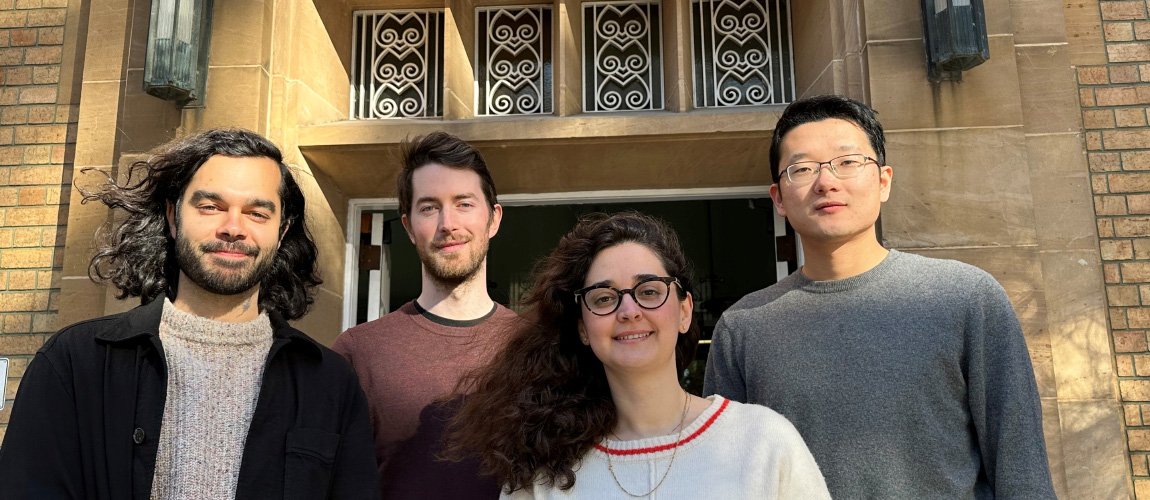
From left to right, the Avail Solar Team of Joshua Ezackial, Nicholas Kirkwood, Eliza Rokhsat and Yixiong Ji. Not pictured: Anglea Keyte
The Avail Solar team featuring members of Exciton Science were awarded a bonus of AU$4,000 following their involvement in CSIRO’s ON Prime program.
Avail Solar set out to identify the major technical problems across the photovoltaics value chain and learn if solution-processed copper zinc tin sulfide selenium solar cells might address these problems.
To understand this, the team interviewed a range of companies and people, including the world's largest silicon PV manufacturer in China, PV installers, architects, and grid-scale solar farm managers.
The team's findings confirmed expectations that lightweight, flexible and cheaply manufactured PV may struggle to compete directly with silicon PV in existing rooftop and grid-scale PV installations, due to the huge investment at every level of the conventional PV value chain in silicon-specific materials, processes and skills, as well as a risk-averse mindset exacerbated by the need for product lifespans of more than 20 years.
However, Avail Solar learned there may be early markets for CZTSSe in niche areas where flexibility, weight or the aesthetics of panels are more important than efficiency.

Above: Team member Angela Keyte working on CZTS(Se) solar cells at the University of Melbourne
The team did identify clear interest in affordable enhancements of silicon PV efficiencies using a tandem structure where a solution-processed cell is added on top of a conventional silicon cell.
For end users of PV, this would reduce the need for complex land purchases or increasing roof-space to increase power output. For silicon manufacturers, it would allow significant product efficiency gains and a new competitive edge.
Indeed, several companies have recently announced impressive results for silicon/perovskite tandems, but we anticipate CZTS cells will offer longer product lifetimes and avoid toxicity concerns associated with perovskites.
The team featured PhD students Yixiong Ji, Angela Keyte and Eliza Rokhsat, together with the Centre’s Science and Industry Liaison Manager Dr Nicholas Kirkwood and Outreach Officer Joshua Ezackial.
Heyou Zhang wins Chancellor's Prize
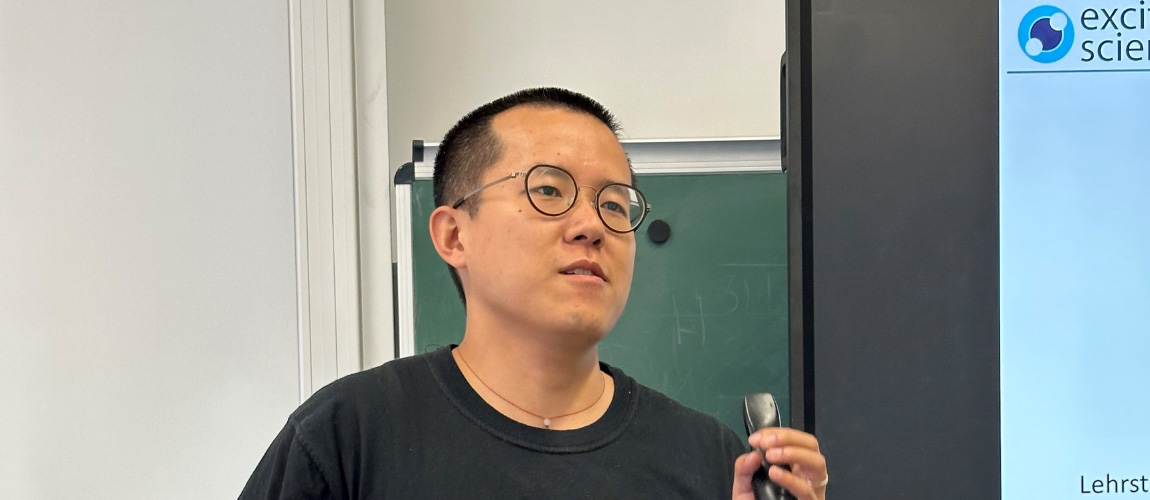
Exciton Science graduate Heyou Zhang
Exciton Science graduate Heyou Zhang has been awarded the University of Melbourne Chancellor’s Prize 2023 for Science and Engineering.
Heyou, who completed his PhD in 2022, received the prize for his thesis ‘Direct Assembly of Single Nanocrystal Arrays’.
A former member of the Nanoscience Laboratory under the supervision of Professor Paul Mulvaney, Heyou also completed his Msc at the University of Melbourne.
He is now a postdoctoral researcher with Exciton Science Associate Investigator Professor Jürgen Köhler at the University of Bayreuth.
Heyou’s close relationship with Exciton Science has continued, as he is contributing to Optical excitations in organic and inorganic semiconductors (OPTEXC), an International Research Training Group involving the University of Melbourne, Monash University and the University of Bayreuth.
Nominations for the Chancellor’s Prize are made by faculties on the basis of international recognition and impact of the research, publications or other research outputs that arise from or relate to a thesis, and recognition of the research (by professional organisations, prizes and awards and invitations to conferences.
Heyou’s thesis formed the basis of a paper, ‘A General Method for Direct Assembly of Single Nanocrystals’ published in the journal Advanced Optical Materials.
Carol Hua receives WISER Award & Alan Sargeson Lectureship
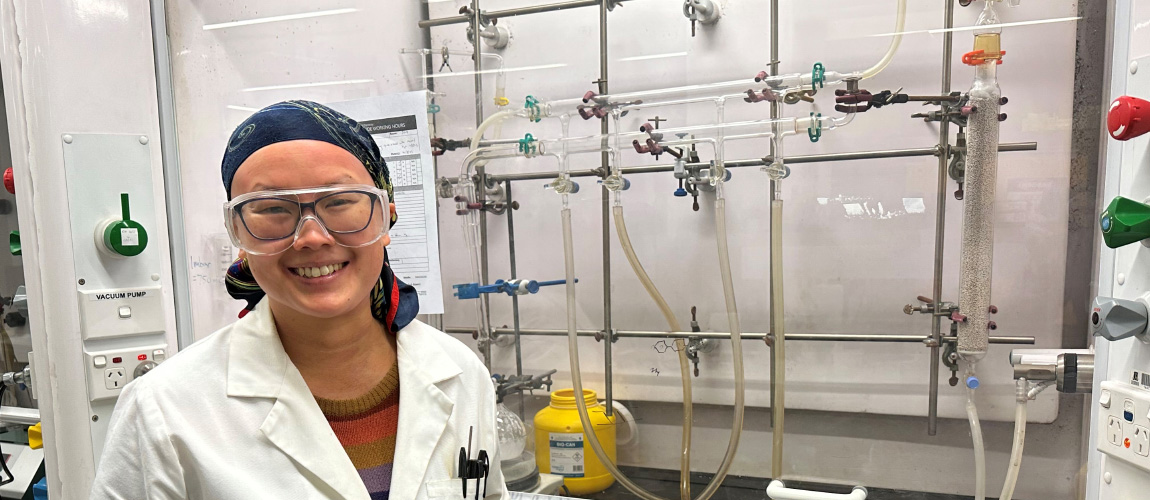
Research Fellow Carol Hua
Exciton Science congratulates Dr Carol Hua as a recipient of both the Women in Science Emerging Researcher (WISER) Award and the RACI Alan Sargeson Lectureship.
Launched by the University of Melbourne’s Faculty of Science in 2020, the WISER Award aims to address the issue of high attrition rates among female staff in the early stages of their career, leading to low representation of women in senior leadership and research roles.
WISER highlights two early or mid-career researchers each year and provides them with the resources to further their career. The award recognises research excellence, leadership capacity and potential, and engagement with outreach activities.
“During my undergrad, I think nearly all my professors were male,” Carol said.
“One of the few female professors, Professor Barbara Messerle was my Honours supervisor.
“I also had a female supervisor in my PhD, Professor Deanna D’Alessandro. When I started with her, we were her first PhD students. Now she’s Director of the Net Zero Initiative at the University of Sydney. It is inspiring to see the success that she has had.”
“I think having role models is extremely important because they show it is possible to succeed in academia, and in the traditionally male-dominated area of chemistry, as a woman. That is it possible to balance a research career with family commitments.”
Carol returned to the University of Melbourne and joined Exciton Science in early 2023. As she begins to assemble her own research group, now it’s her chance to show younger students a path to professional success.
“I'm conscious there are still few women,” she said.
“From a cultural diversity point of view, I'm one of the few Asian women among the academics.
“It's a bit humbling to be thinking that I'm in the role of inspiring the next generation, but it's also such an important part as well.”
While some important progress has been made, Carol remains well aware that further structural change is necessary to enable academics to enjoy a better balance of work and life.
“I'm conscious that if you were to take any time off, it's very difficult to keep a research career going due to the loss of momentum,” she said.
Carol also received the Alan Sargeson Lectureship from the Royal Australian Chemical Institute (RACI).
The Alan Sargeson Lectureship is a prestigious early career researcher award in the form of a lectureship that acknowledges significant and innovative individual contributions to the field by researchers within ten years of the award of their PhD.
Former winners of the Lectureship include Exciton Science Associate Investigator Colette Boskovic.
After a period of time at Deakin University, Carol is now a colleague of Colette at the University of Melbourne once again.
She joined Exciton Science to continue her work on the development of metal-organic frameworks as chemical sensors and stimuli responsive materials.
“It's been really great to be back at the University of Melbourne,” she said.
“The transition was much smoother than I thought it would be.
“The Centre has been fantastic, especially for the opportunities to meet new people and branch out into new areas of research.”
Nas Meftahi wins RMIT ECR Award
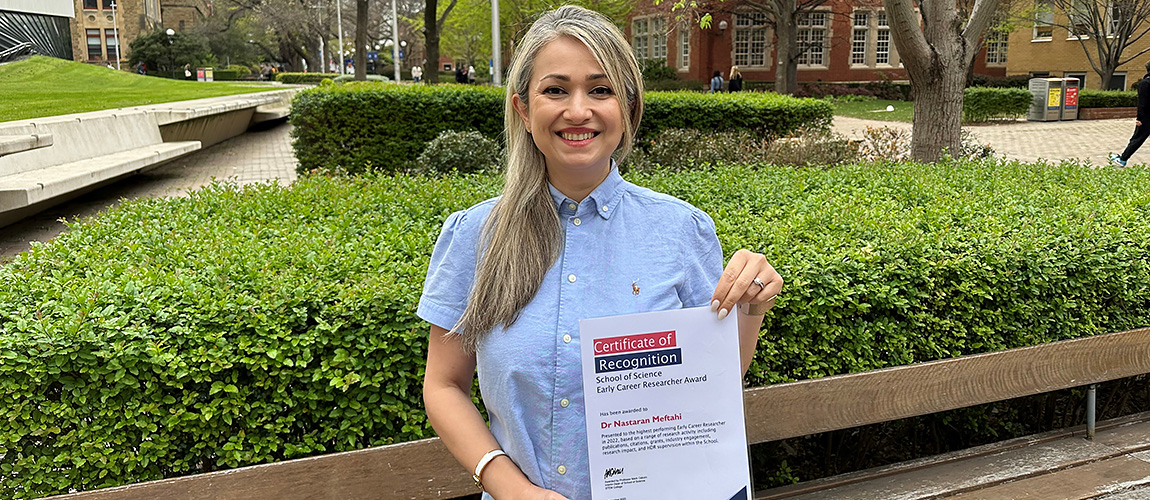
Research Fellow Nas Meftahi
Exciton Science Research Fellow Dr Nas Meftahi has received the School of Science Early Career Researcher Award from RMIT University.
The award is presented to the highest performing ECR in 2022, based on a range of research activity, including publications, citations, grants, industry engagement, research impact and HDR supervision within the school.
Nas, who completed her PhD at La Trobe University in 2018, has extensive experience with computational methods such as machine learning techniques and molecular dynamic simulations.
Her research primarily focuses on applying linear and nonlinear machine learning techniques, specifically advanced forms of multiple linear regression and artificial neural networks, to explore the relationships between structure and properties of various materials, such as solar cells and fluorescent polymers.
She also uses molecular dynamics simulations and electronic structure calculations to examine the mutual orientation and properties of organic photo-dyes in solar cell matrices.
Her work has been published in Advanced Energy Materials, Chem, Nature Chemistry, Nature Nanotechnology, Nature Synthesis, Nature Communications, Advanced Materials, ACS Nano, and npj Computational Materials.
You can read more about Nas’s work here:
Read moreAnita Ho-Baillie joins Exciton Science colleagues as Fellow of the Royal Society of Chemistry
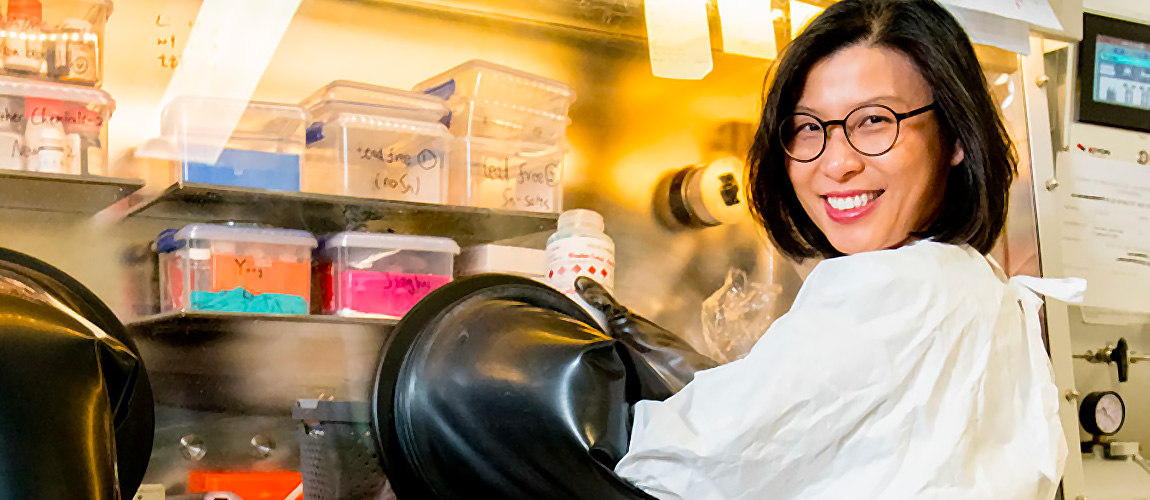
Associate Investigator Anita Ho-Baillie
Exciton Science Associate Investigator Anita Ho-Baillie has been elected a Fellow of the Royal Society of Chemistry in the United Kingdom.
Anita, the John Hooke Chair of Nanoscience at the University of Sydney, and Exciton Science Chief Investigator Tim Schmidt of UNSW Sydney, have both been elected in the most recent round of appointments.
They join Exciton Science Director Professor Paul Mulvaney and Exciton Science Chief Investigator Professor Emeritus Ken Ghiggino, both from the University of Melbourne, as FRSCs, demonstrating the continuing major contributions of Centre members to the advancement of high-level research in chemistry.
The Royal Society of Chemistry, with a rich history dating back to 1841, bestows the title of Fellow upon distinguished researchers who have made substantial contributions to the advancement of the chemical sciences.
In each year from 2019 to 2022, Anita was named a Clarivate Highly Cited Researcher, a title awarded to individuals whose work ranks within the top 1% of citations for a given field, showcasing the highly impactful nature of her research. She was also heralded as Australia’s Leading Sustainable Energy Researcher by The Australian newspaper.
Reflecting on the recent accolade, Anita said,
"Being recognised by peers and esteemed institutions is truly an honour. However, the real reward is seeing our research contribute to creating a more sustainable future."
Anita’s main areas of interest span the development of advanced solar cells, with a particular emphasis on perovskite and tandem solar cells, as well as increasing their long-term stability. Such advancements play a crucial role in the global transition toward cleaner and more sustainable energy solutions.
The election of both Anita and Tim to the RSC in the same year is a testament to the calibre of research taking place at Exciton Science.
To read more about Tim’s election as an FRSC and his career, go to:
Read moreTim Schmidt elected Fellow of Royal Society of Chemistry

Chief Investigator Tim Schmidt
Exciton Science Chief Investigator Professor Tim Schmidt has been elected a Fellow of the Royal Society of Chemistry (FRSC).
Based in the United Kingdom, the Royal Society of Chemistry was formed in 1980 through the amalgamation of several prestigious societies, including the Chemical Society (established in 1841) and the Royal Institute of Chemistry, as well as the Faraday Society and the Society for Analytical Chemistry.
The designation FRSC is awarded to those who have made an outstanding contribution to the chemical sciences.
Current fellows include Nobel Laureate Fraser Stoddart, Dame Margaret Brimble, Martyn Poliakoff, and Natalie Stingelin, as well as Exciton Science collaborator Garry Rumbles.
Tim joins his fellow Exciton Science Chief Investigators Prof. Paul Mulvaney and Prof. Emeritus Ken Ghiggino as FRSCs.
Prof Schmidt is the leader of the Molecular Photonics Laboratory at UNSW Sydney.
He was awarded the Liversidge Lecture for 2022 by the Royal Society of New South Wales and the 2021 Royal Australian Chemical Institute (RACI) Physical Chemistry Division Medal.
You can read more about Tim’s career and research interests here:
Read moreGirish Lakhwani appointed Associate Dean & joins ARC College of Experts
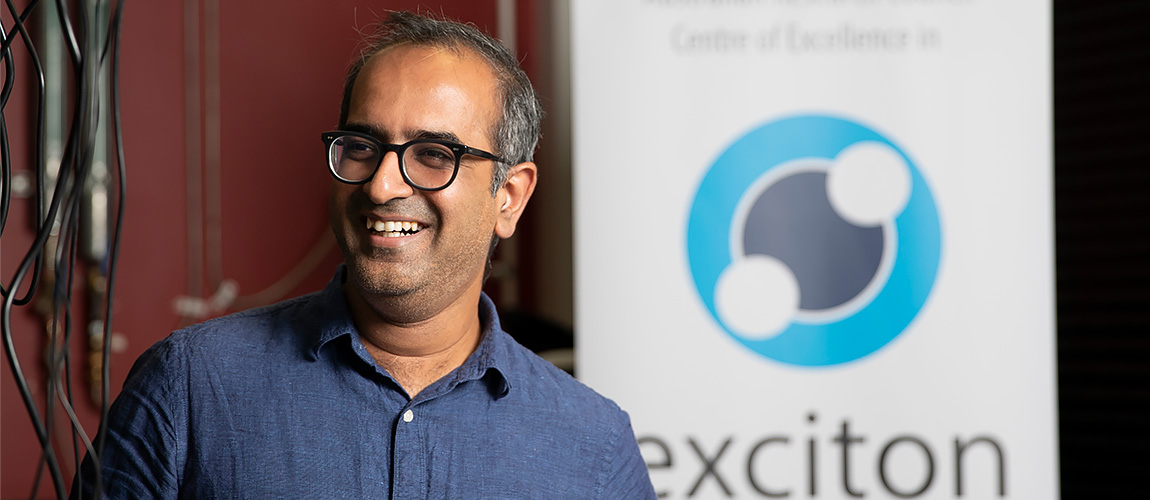
Chief Investigator Girish Lakhwani
Exciton Science Chief Investigator Girish Lakhwani has been appointed Associate Dean, Faculty of Science for the Strategic Partnerships and External Engagement (SPEE) portfolio at the University of Sydney.
Girish, an Associate Professor in the School of Chemistry, will lead the Faculty of Science’s work in all areas of external engagement, foremost with industry, but also with other entities within the University, other universities (both Australian and international), government organisations, and NGOs.
He will facilitate the interaction of the academic staff of the Faculty with industry and government organisations, including communication of the Faculty’s research strengths, development of partnerships, initiating research agreements and maintenance of ongoing relationships.
In addition to his new role as Associate Dean, Girish has been selected to join the Australian Research Council’s College of Experts.
To support the advancement of knowledge and contribute to national innovation, the ARC engages a College of Experts to play a key role in identifying research excellence.
Its members are experts of international standing drawn from the Australian research community - from higher education, industry and public sector research organisations.
To read more about the ARC College of Experts, go to:
Read moreSam Zaman wins GCI Women in STEM Student Award
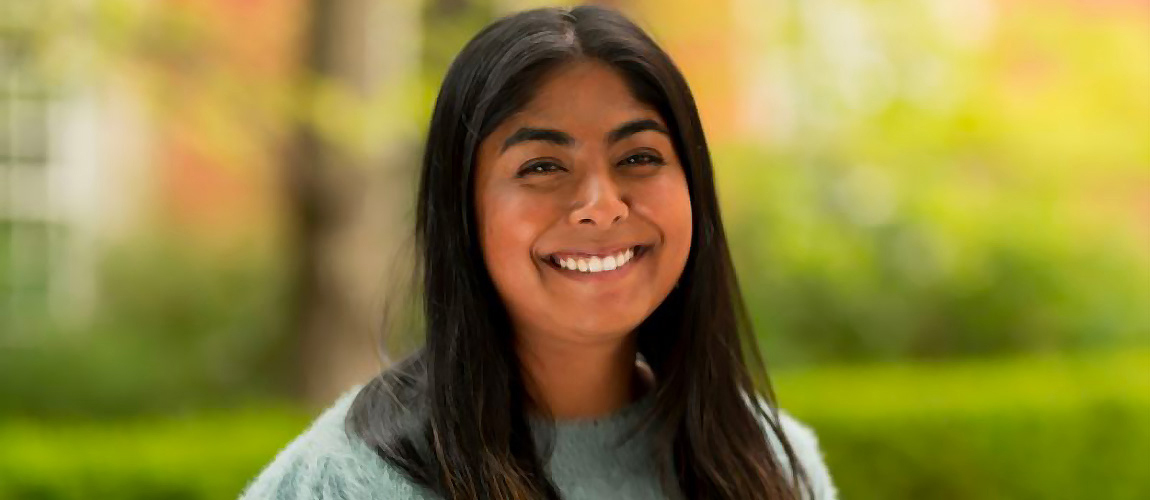
PhD student Samantha Zaman
Congratulations to Exciton Science PhD student Samantha Zaman, winner of the Graeme Clark Institute (GCI) Women in STEM Student Award for 2023.
The GCI Women in STEM Student Award is a research-support initiative which aims to acknowledge, celebrate achievements and provide opportunities for women graduate researchers at the University of Melbourne who are contributing to innovation and leadership in the biomedical engineering field.
Sam, who is studying a joint PhD with the University of Melbourne and KU Leuven in Belgium, is exploring multifunctional nanomaterials and advanced cell models for singlet oxygen generation in photodynamic therapy.
To read more about Sam’s research, go to:
Read moreExciton Science members awarded National Intelligence & Security grant
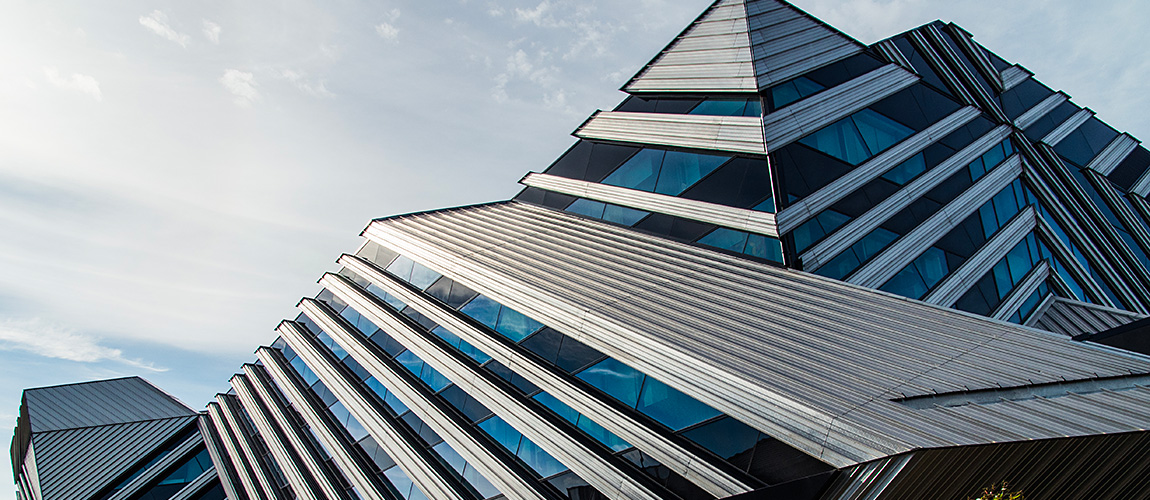
Exciton Science Chief Investigator Udo Bach and his collaborators have received a National Intelligence and Security Discovery Research Grant to explore electrically conductive metal coordination networks.
The project aims to explore a novel class of porous electroactive materials which are low-cost, robust and sustainably sourced.
It will uncover structure-property relationships and design rules which will allow researchers to showcase the unmatched performance and tunability of these materials.
Of particular interest will be the ability of these materials to be used in sensing and to interact with radio frequency waves used in telecommunication.
The proposal addresses the Australian Government’s targeted material science exploitation challenge and will lay the foundation for the future exploitation of a new class of emerging electromaterials.
This will help to address technology bottlenecks in sensing, electromagnetic shielding and stealth.
The grant of AU$883,849 has been awarded to Prof. Bach and Professor Arthur Lowery, both of Monash University.
The project will also involve former Exciton Science postdoctoral researcher Dr Kalim Kashif of Green Shield Solutions, and was funded in its early stages by Exciton Science Connect Program Entrepreneurship funding.
The same team have been awarded a further AU$292,863 via an Australian Economic Accelerator Seed Grant led by Dr. Kalim Kashif, to work on applications of their electrically conductive metal coordination networks with Defence-related industry partners.
Theme 3: Excitonic Systems for Security, Lighting and Sensing
Member Profile - Selina Süzeroğlu